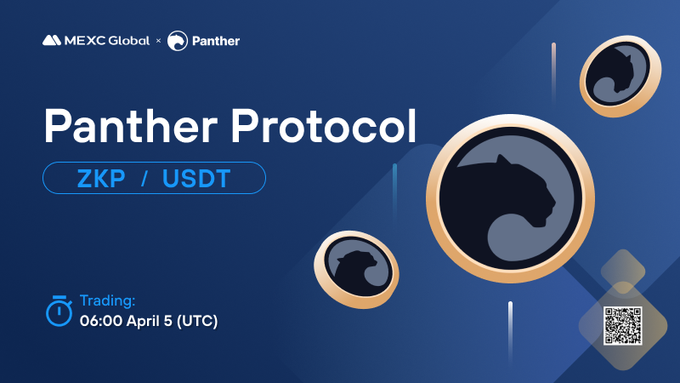Panther Protocol offers a comprehensive solution that enables the restoration of privacy in the context of Web3 and DeFi. Furthermore, this platform allows financial institutions to maintain full control over their data while participating in decentralized finance.
Essential information for their token is available on the MEXC Digital asset introduction page. Furthermore, we are listing (ZKP/USDT – Trade it here) on our Innovation Zone! Check it out now!

What Exactly is Panther Protocol (ZKP)
Panther Protocol aims to provide on-chain interoperable privacy for transactions between DeFi applications and users. Its primary objective is to restore the balance of transactional privacy and compliance.
By default, Panther Protocol provides DeFi users with complete privacy, allowing them to choose to make zero-knowledge disclosures or full disclosures to specific counterparties at their discretion.
However, it is essential to ensure that the transactions are not open for everyone to see and exploit. A fully transparent transaction history that is available to everyone can be catastrophic. Therefore, Panther Protocol aims to integrate privacy into the DeFi and Web3 space. This is crucial, as without privacy, the new systems could potentially be worse for society than the existing legacy systems that they seek to disrupt.
How Does Panther Protocol Work?
Panther Protocol is a comprehensive privacy protocol for digital assets that can be confidentially deployed on any public blockchain. It facilitates the creation of interoperable zero-knowledge assets (zAssets), which are fully collateralized 1:1 with their original counterparts.
Crypto assets are stored securely in Panther vaults, and zAssets are minted in exchange. Each zAsset is backed by its underlying asset in a one-for-one ratio. Whether it’s a zUSDC, zETH, or zBTC, the resulting zAsset is a private, fully collateralized synthetic version of the original asset.
Key Features of Panther Protocol
Panther Protocol is a privacy protocol that offers several key features. Firstly, it provides privacy for any digital asset, regardless of layer 1 or type of asset. The privacy features of Panther is extendable to any digital asset on any public layer 1 or peerchain. This ensures that zAssets can go wherever DeFi goes.
Secondly, Panther offers interoperability through a private interchain DEX module that facilitates cross-chain transactions. As there is unlikely to be one chain that rules them all, Panther recognizes the need for cross-chain transactions and will provide a private solution for this purpose.
Thirdly, Panther ensures confidentiality by allowing users to select the level of privacy they want at the transaction level. Users can selectively disclose any of their transactions to meet the requirements of the counterparty or regulator. Meanwhile, Panther will ensure that a certain privacy threshold is met to enable transactions of a particular zAsset to go through.
Fourthly, Panther provides a price discovery mechanism for privacy, which is not common in most privacy protocols. Privacy is explicitly priced through dynamic transaction fees paid in ZKP rather than as a fee applied to the transacted digital assets. The more privacy is provided to users, the cheaper it becomes to enjoy privacy, resulting in powerful network effects for on-chain privacy.
Lastly, Panther ensures a strong privacy threshold by incentivizing liquidity provision for mixing. This ensures that there is a large enough pool of assets to provide a robust privacy threshold for users. Overall, these features make Panther a comprehensive privacy protocol for digital assets that are highly flexible, interoperable, and confidential.
What Is Available in Panther Protocol?
Panther Protocol has several key technology components that work together to provide privacy-enhancing solutions for DeFi transactions. Here is a breakdown of what each component does:
- Panther Wallet: A browser-based, self-custodial wallet that prevents address reuse and allows for private connections to Ethereum DeFi using proxy addresses. It also allows users to vote on governance proposals.
- Panther Vaults: These are autonomous, zero-knowledge, self-custodial smart contracts that act as decentralized custodians for collateral of zAssets.
- Privacy Miners: Network participants who are rewarded in ZKP tokens for providing zAssets to Panther Protocol, which helps to increase the anonymity set and improve privacy.
- Panther Layer 1 Interchain DEX: This allows users to transact between peerchains through private cross-chain transactions.
- Panther Service Providers: These are entities that use Panther to enable private (zAsset) transactions with their customers (Panther users) while being able to trust those users.
- Panther Trust Providers: These entities provide verifiable statements (attestations) about users, which allows service providers to increase their trust in those users.
Tokenomics of ZKP Token
The initial circulating supply of ZKP tokens will be approximately 20% of the total supply, with the remaining tokens being subject to vesting schedules for the team, advisors, and ecosystem development. The vesting schedules will vary, with longer vesting periods for team members and shorter periods for advisors and ecosystem development.
ZKP tokens are the main currency for transaction fees within the Panther ecosystem. The token supply will be deflationary through a token burn mechanism. Furthermore, the token burn will be applied to a portion of the transaction fees. This will reduce the circulating supply of ZKP tokens over time. Additionally, Panther Protocol will use a portion of the transaction fees to buy back ZKP tokens on the open market and then burn them, further reducing the supply.
The governance model of Panther Protocol will be based on a decentralized autonomous organization (DAO). Here, ZKP token holders can propose and vote on changes to the protocol. The voting will include issues such as upgrades to the Panther Vaults or adjustments to the privacy threshold. Each ZKP token represents one vote in the governance process, with larger token holders having more influence in the decision-making process.
Where to buy ZKP Token
You can find ZKP Token here at MEXC! We are listing ZKP/USDT in our Innovation Zone!
What is the Price of ZKP Tokens?
ZKP token is currently trading at MEXC for the price of $0.03965 per unit. It has a fully diluted market cap of $39,647,297. It also has a 24-hour trading volume of $91,093. You can check the live price of their token right here!
How to buy ZKP Tokens on MEXC
You can buy ZKP Tokens on MEXC by following the steps:
- Log in to your MEXC account and click [Trade]. Click on [Spot].
- Search “ZKP” using the search bar to see the available trading pairs. Take ZKP/USDT as an example.
- Scroll down and go to the [Spot] box. Enter the amount of ZKP you want to buy. You can choose from opening a Limit order, a Market order, or a Stop-limit order. Take Market order as an example. Click [Buy ZKP] to confirm your order. You will find the purchased ZKP in your Spot Wallet.
You can find a detailed guide on how to buy ZKP Tokens here.
Keep Yourself Updated With The Crypto Trend
Check out all of the listings in the Innovation and Assessment zones as well as the major tokens in the Main Zone – we have more amazing projects to come! What’s more, MEXC lists moonshots and offers access to trade major cryptocurrencies. Visit the Hot Projects section as well to uncover more featured popular tokens. Lastly, feel free to visit MEXC Academy to learn more about cryptocurrency!
Join MEXC and Start Trading Today!



